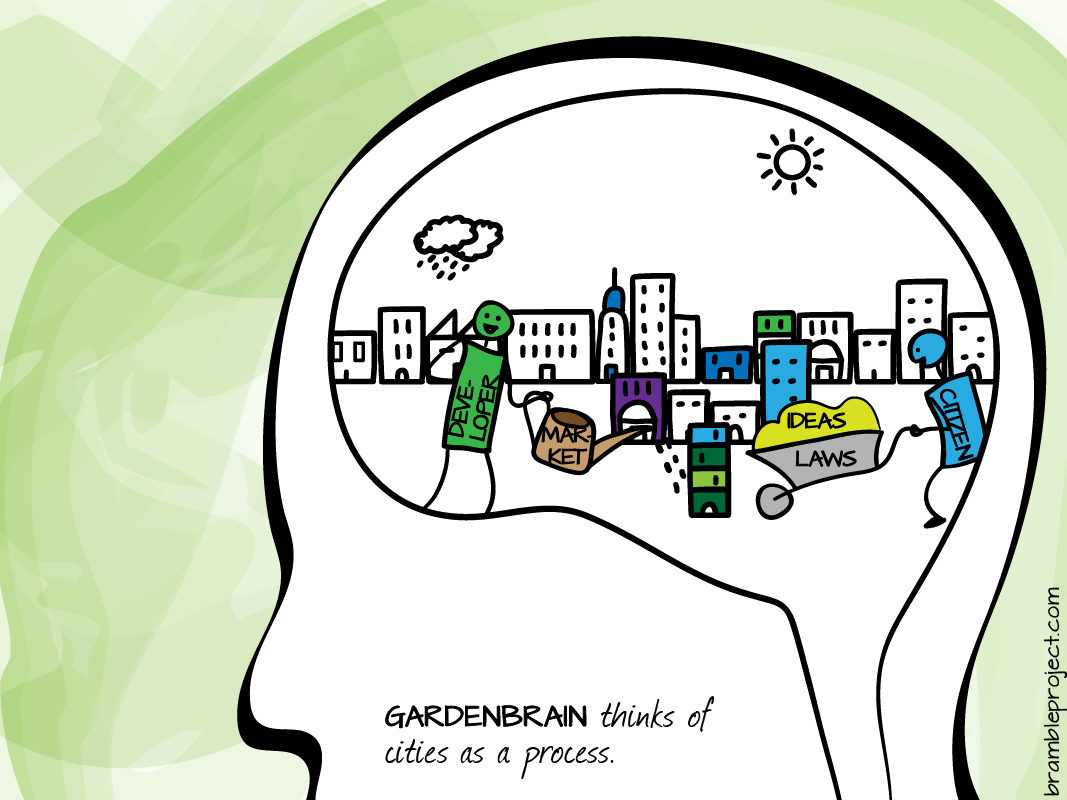What the heck is development culture, anyway? And why are we so interested in it?

I was quite excited to see Canadian Prime Minister Justin Trudeau list The Gardens of Democracy as one of his two favorite nonfiction titles. This under-sung little book has deeply influenced how Brian and I think about urban development, using a concept called “Gardenbrain”. Here’s hoping that a big shout-out from Canada’s “little potato” will help get the word out.
The book has helped us frame the importance of exploring the culture of real estate development. In other words, it’s more than markets and regulation that influence developers. Think to your own work: are you just a puppet of money and laws? You might concede that you’re also a bundle of feelings and dreams, deeply influenced by the people around you.
Machinebrain
The thrust of the book is that most ideologies today view our jobs as citizens to be the task of voting on the “machine” that will output the best possible society. This notion applies whether we support free-market libertarianism or careful government regulations. In urban development, we focus heavily on regulators, code, and financing to create the cities that we want to live in. The authors call this form of thinking “Machinebrain”.

While finance and laws are important, I’d argue that they miss a fundamental piece of the puzzle: what makes developers give a fig? What makes them want to participate positively in the growth of a city, rather than simply build, profit, and walk away? What, for that matter, makes developing real estate different from investing in stocks?
For many developers, frankly, there’s no difference. They’re mentally stuck generating returns for themselves or for their investors. But many others are shifting their idea of what it means to be a real estate developer. Perhaps they see their careers as more than just earning a living. Maybe they see buildings more as unique fingerprints than as widgets. Some developers were once frustrated architects, and seek autonomy to build things they believe in. And some developers, privileged with a degree of financial freedom, simply find profit alone rather dull, and enjoy the praise that comes with a project thoughtfully done.
Gardenbrain
Encouraging creativity or thoughtfulness in development—simply because it gives a person joy to actively participate in a community—reflects the participatory citizenship that Eric Liu and Nick Hanauer describe as “Gardenbrain”. Gardenbrain embraces emergent, organic outcomes over mere building to code. Gardenbrain happens when we speak to each other as humans and not just well-ironed business suits.

Machinebrain is quite skeptical of Gardenbrain. After all, the outcomes of dialogue are not predictable. Our society still tends to prefer the (pseudo-)certainty of zoning ordinances and five-year strategic plans. The uncertainty of relying on dialogue makes most of us uneasy, if not downright queasy—particularly where developers have not historically proven to be a trustworthy bunch, and when neighborhoods sometimes ask for impossible things.
Nonetheless, Brian and I think that it’s time to bring more Gardenbrain to urban development, for two reasons. First, as communication becomes more democratic, we’ll find it less necessary to talk to each other through bureaucracies. And second, as visions flourish from the ground up, codifying the perfect city will start to feel as futile as chasing the perfect fingerprint. Sooner rather than later, we hope that developers and citizens alike will come to prefer the fluidity of dialogue over ever-thicker stacks of building codes.
There’s an excellent summary of The Gardens of Democracy here. For more ideas on shifting industry cultures from within, check out Join the Club and Nudge.


Leave a Reply